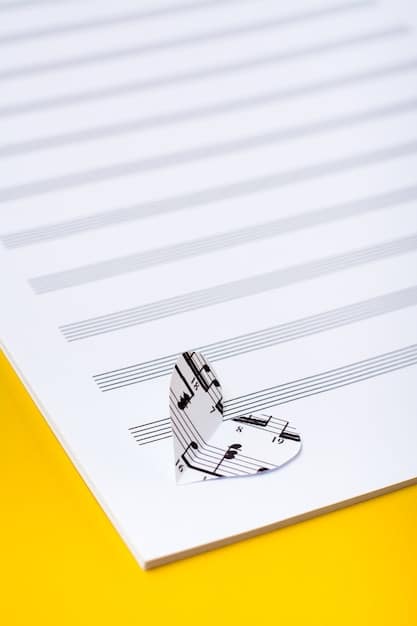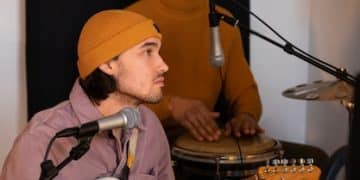Music Licensing for Emerging Artists: 3 Proven Strategies

Emerging artists can secure their first music licensing deal this year by focusing on creating high-quality music, building strong relationships within the industry, and understanding the legal aspects of licensing agreements.
For emerging artists: 3 proven strategies to secure your first music licensing deal this year, success often hinges not just on talent, but also on strategic planning and execution. Navigating the music industry can feel like traversing a maze, but understanding how to approach music licensing can significantly boost your career.
Understanding Music Licensing for Emerging Artists
Music licensing is a critical aspect of the music industry, allowing artists to monetize their work by granting permission for others to use their music. For emerging artists, understanding the basics of music licensing is essential for protecting their rights and generating income.
It’s not just about earning money; it’s about gaining exposure and recognition in a competitive field. Let’s explore what music licensing truly entails and why it’s important.
What is Music Licensing?
Music licensing involves granting permission to another party to use copyrighted music in a specific way. This usage can range from featuring a song in a film or TV show to using it in a commercial or video game. The license specifies the terms of use, including the duration, territory, and compensation.
For emerging artists, understanding this process is vital to ensure they are fairly compensated and that their work is used appropriately.
Why is Music Licensing Important?
Music licensing provides several key benefits for artists:
- Revenue Generation: Licensing can be a significant source of income, especially for independent artists.
- Rights Protection: It ensures that your music is used legally and ethically.
- Exposure: Placements in popular media can greatly increase your visibility.
- Creative Control: You retain control over how your music is used and who uses it.

By actively pursuing music licensing opportunities, emerging artists can pave the way for sustainable careers and creative growth.
Strategy 1: Crafting High-Quality, License-Ready Music
The foundation for securing music licensing deals lies in the quality and readiness of your music. Creating professional-sounding tracks and ensuring they are easily accessible are crucial steps for attracting potential licensees. Start with the basics to ensure you present the best version of your art.
You should focus on developing a catalog of high-quality tracks ready for licensing.
Producing Professional-Quality Tracks
Investing in professional recording, mixing, and mastering can significantly increase the appeal of your music to potential licensees. High-quality sound is essential for placements in film, TV, and advertising. Even the most creative music will perform poorly when audio quality is suffering.
Consider collaborating with experienced producers and engineers to achieve a polished, professional sound.
Creating Diverse Genre Offerings
Diversifying your musical catalog by exploring different genres and styles can broaden your appeal to a wider range of potential licensees. A versatile catalog increases the likelihood of your music being suitable for various projects.
Experiment with blending genres and incorporating unique sounds to create a distinctive musical identity.
Ensuring Metadata Accuracy and Completeness
Accurate and complete metadata is crucial for potential licensees to find and evaluate your music. Metadata includes information such as the title, artist, genre, mood, and keywords. Accurate metadata is essential for making your music discoverable and ensuring proper attribution and payment when it is licensed.
- Title: Ensure each track has a clear and accurate title.
- Artist Name: Use your professional artist name consistently.
- Genre: Categorize your music by genre and sub-genre.
- Mood: Describe the emotional tone of the music (e.g., happy, sad, energetic).
By focusing on the quality and accessibility of your music, you can significantly increase your chances of securing lucrative licensing deals. This requires some effort, but once a proper system is in place it will make future submissions a breeze.
Strategy 2: Building Industry Relationships and Networking
Networking and relationship-building are crucial for emerging artists: 3 proven strategies to secure your first music licensing deal this year. Establishing contacts with music supervisors, publishers, and other industry professionals can open doors to licensing opportunities that might otherwise be inaccessible. These people can also become repeat customers if they appreciate working with you.
These relationships often lead to direct licensing deals.
Attending Industry Events and Conferences
Participating in industry events such as music conferences, workshops, and showcases provides opportunities to network with potential licensees and learn about current trends in music licensing. These events often feature panels and presentations on music licensing, offering valuable insights and advice. Check out some of the larger conventions, and follow your favorite artists to smaller local gatherings.
Engage in conversations, exchange contact information, and follow up with new connections after the event.
Leveraging Social Media and Online Platforms
Utilizing social media platforms such as LinkedIn, Twitter, and Instagram can help you connect with industry professionals and showcase your music. Engage with music supervisors, publishers, and other artists by sharing their content and participating in relevant discussions.
Create a professional online presence that highlights your music and licensing capabilities.
Direct Outreach to Music Supervisors and Publishers
Research and identify music supervisors and publishers who work on projects that align with your musical style. Craft personalized outreach messages introducing yourself and your music, highlighting why it would be a good fit for their projects. Make sure you are thorough in your research and don’t contact the wrong people, or you risk burning bridges.
- Research: Identify supervisors and publishers in your genre.
- Personalize: Tailor your message to each recipient.
- Highlight: Showcase relevant tracks and licensing capabilities.
- Follow-Up: Send timely follow-up messages after initial contact.

These connections can provide invaluable insights and access to new opportunities. The stronger your connections, the easier it will be to secure licensing deals and build a sustainable career.
Strategy 3: Mastering the Legal Aspects of Music Licensing
Understanding the legal aspects of music licensing is crucial for protecting your rights and ensuring fair compensation. Familiarizing yourself with licensing agreements, copyright laws, and performance rights organizations (PROs) can help you navigate the complex landscape of music licensing with confidence. It may seem boring, but it’s absolutely essential for protecting your business.
Let’s discuss the different components of licensing.
Understanding Licensing Agreements
Familiarize yourself with the different types of licensing agreements, including synchronization licenses, mechanical licenses, and performance licenses. Each type of license grants different rights and royalties, so it’s important to understand the terms and conditions before signing any agreement.
Seek legal advice to ensure that the agreement is fair and protects your interests.
Navigating Copyright Laws
Copyright law protects your original musical works from unauthorized use. Registering your music with the U.S. Copyright Office provides legal proof of ownership and strengthens your ability to enforce your rights. Understanding copyright law is vital for preventing infringement and ensuring you receive proper credit and compensation for your work.
Stay informed about changes in copyright law and how they may affect your music licensing activities.
Working with Performance Rights Organizations (PROs)
PROs such as ASCAP, BMI, and SESAC collect and distribute royalties for public performances of your music. Joining a PRO allows you to earn royalties whenever your music is played on the radio, TV, or in public venues. Understanding how PROs work and how to register your music with them is essential for maximizing your income from music licensing.
- Research: Choose the PRO that best fits your needs.
- Register: Register your music with the PRO .
- Report: Report performances of your music to ensure accurate royalty payments.
By mastering the legal aspects of music licensing, you can protect your rights, ensure fair compensation, and confidently navigate the complexities of the music industry. Ignoring it is akin to driving a car with a blindfold on.
| Key Point | Brief Description |
|---|---|
| 🎵 High-Quality Music | Produce professional, diverse tracks. |
| 🤝 Industry Relationships | Network at events, leverage social media. |
| ⚖️ Legal Aspects | Understand licensing agreements, copyright laws. |
| 💰 Revenue Generation | Licensing provides income and rights protection. |
Frequently Asked Questions
▼
A music licensing deal allows someone to use your copyrighted music in various projects, like movies, TV shows, games, or commercials. In return, you receive royalties or fees.
▼
Network with music supervisors, publishers, and attend industry events. Social media and online platforms can also help you connect with potential licensees.
▼
PROs like ASCAP, BMI, and SESAC collect royalties for public performances of your music. Joining ensures you get paid when your music is played on the radio or in venues.
▼
Accurate metadata ensures your music is easily found by potential licensees. It includes title, artist, genre, and mood, helping others discover and properly credit your work.
▼
Register your music with the U.S. Copyright Office to establish legal ownership. Understanding and enforcing copyright laws prevents misuse and ensures proper compensation for your creations.
Conclusion
Securing your first music licensing deal as an emerging artists: 3 proven strategies to secure your first music licensing deal this year requires a blend of musical talent, strategic networking, and legal knowledge. By focusing on these three key strategies – producing high-quality music, building industry relationships, and mastering the legal aspects – you can significantly increase your chances of finding licensing opportunities and building a successful career in the music industry.





